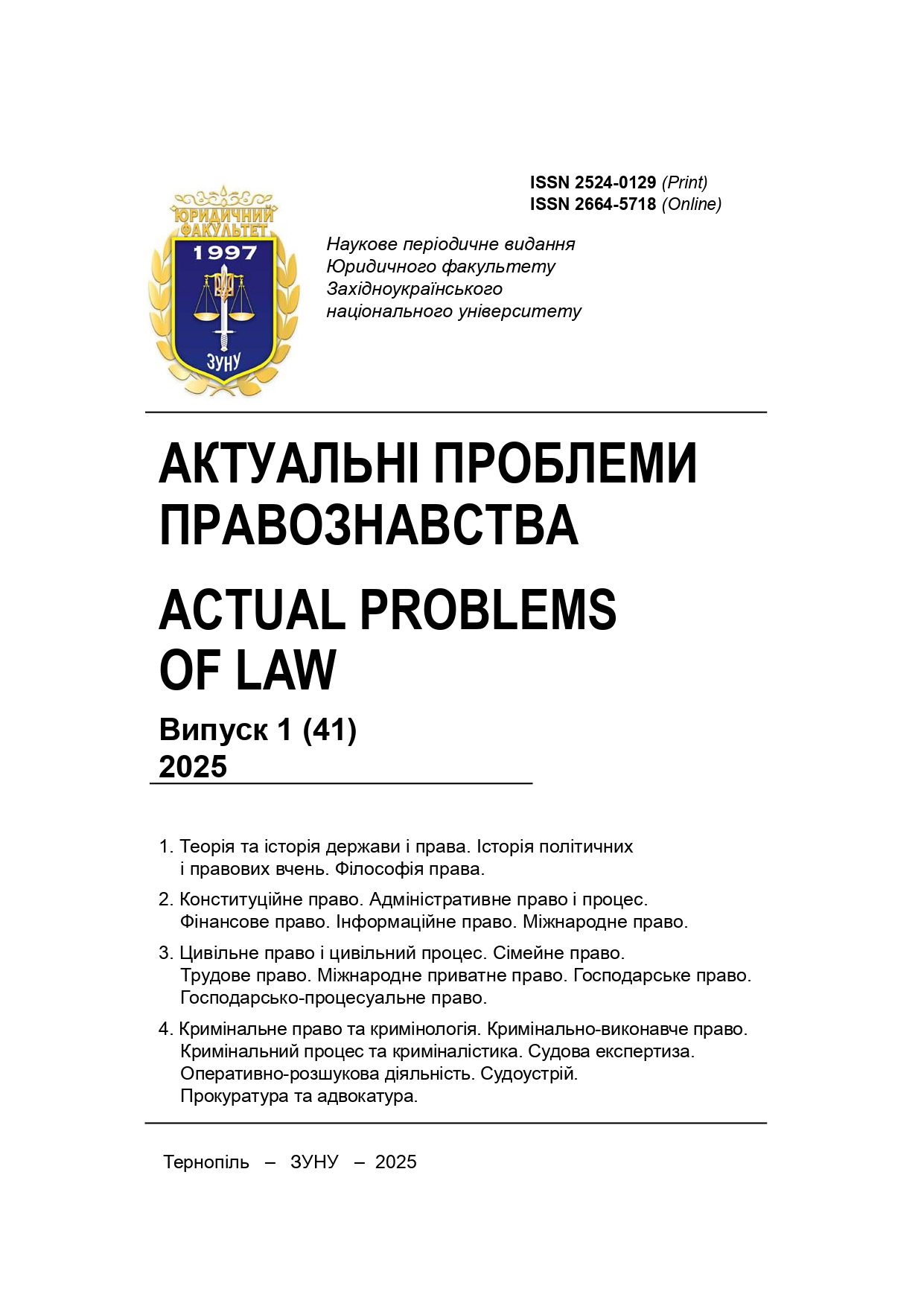Use of artificial intelligence technologies in client defense during criminal proceedings
DOI:
https://doi.org/10.35774/app2025.01.114Keywords:
digital technologies, artificial intelligence, criminal law, advocacy, justiceAbstract
Modern digital technologies have a significant impact on various spheres of social life, particularly the legal system. The use of artificial intelligence (AI) in criminal proceedings opens up new opportunities for lawyers, judges, prosecutors, and other participants in the judicial process. Through the automation of routine processes, intelligent analysis of large volumes of information, and rapid prediction of court decisions, legal practice becomes more efficient and technologically advanced. This is especially important in the context of an increasing number of court cases, the complexity of legal norms, and the need for quick access to legal information.
The article explores the role of artificial intelligence in the context of client protection in criminal proceedings within the legal system of Ukraine. It is noted that modern algorithms can significantly assist lawyers in preparing for court proceedings, analyzing case materials, searching for relevant legal precedents, and determining the best defense strategy for the client. The use of AI technologies allows for improved accuracy in legal analysis, reduced time for information retrieval, and minimized risk of human error.
The main areas of AI application in legal practice are outlined, including the analysis of case law, precedent search, assessment of evidentiary bases, prediction of court decisions, automated creation of legal documents, and the use of legal Chatbots for initial consultations. The implementation of such tools enables lawyers to focus on the strategic aspects of client defense rather than routine work.
The article examines the potential benefits and risks of AI use in criminal proceedings. The main advantages include the speed and accuracy of legal data processing, increased efficiency in legal work, and the minimization of human error in evidence analysis. At the same time, the risks include issues of algorithmic bias, the possibility of using incorrect or incomplete data, and the lack of regulatory oversight on AI use in court proceedings in Ukraine, which could lead to violations of human rights.
The article also provides an analysis of the potential prospects for AI use in the field of criminal defense in Ukraine. It substantiates the necessity of developing relevant legislative initiatives that would regulate the legal aspects of digital technology usage in criminal proceedings, as well as the need to train lawyers and legal professionals in working with such tools.
Thus, the use of artificial intelligence in the field of criminal law opens up significant opportunities for improving the efficiency of judicial processes and client defense. However, to ensure transparency and fairness, it is essential to establish clear legislative frameworks that will regulate the use of such technologies in Ukraine’s legal system.
Downloads
References
1. Baranov, O. (2023). Definition of the term «artificial intelligence». Information and Law, 1(44), 32–49 [in English] https://doi.org/10.37750/2616-6798.2023.1(44).287537
2. Vara, A. M. (2013). Rol advokata u kryminalnomu protsesi [The role of a lawyer in criminal proceedings]. Advokatura: mynule ta suchasnist: Materialy II mizhnarodnoi naukovoi konferentsii molodykh vchenykh, aspirantiv ta studentiv (Odesa, March 2, 2013). Odesa: Feniks, 275-277 [in Ukrainian]
3. Radutniy, O. (2024). Liability of a legal entity in criminal law in the refraction of legal personality of artificial intelligence. Information and Law, 2(49), 138–150 [in English] https://doi.org/10.37750/2616-6798.2024.2(49).306193
4. Karchevskyi, M. V. & Radutniy, O. E. (2023). Artificial intelligence in Ukrainian traditional categories of criminal law. Herald of the Association of Criminal Law of Ukraine, 1(19), 1–25 [in English] https://doi.org/10.21564/2311-9640.2023.19.281123
5. Buhera, O. I. (2021). Vykorystannia shtuchnoho intelektu dlia zapobihannia zlochynnosti [The use of artificial intelligence for crime prevention]. Vcheni zapysky TNU im. V. I. Vernadskoho. Seriia: Yurydychni nauky - Scientific Notes of Vernadsky National University of Kyiv. Series: legal sciences, 6, 82–86 [in Ukrainian] https://doi.org/10.32838/TNU-2707-0581/2021.6/13
6. Hallevy, G. (2013). When Robots Kill: Artificial Intelligence under Criminal Law. Northeastern University Press [in English]
7. Ushakova, I. O. (2019). Pidkhody do stvorennia intelektualnykh chat-botiv [Approaches to creating intelligent chatbots]. Systemy obrobky informatsii – Information processing systems, 2, 76–83 [in Ukrainian]
8. Li, H., Yu, L. & He, W. (2019). The impact of GDPR on global technology development. Journal of Global Information Technology Management, 22(1), 1–6 [in English] https://doi.org/10.1080/1097198X.2019.1569186
Downloads
Published
Issue
Section
License

This work is licensed under a Creative Commons Attribution-NonCommercial 4.0 International License.





